UK Laws and Legal System: Report for Multilingual Organisation
VerifiedAdded on 2023/06/09
|5
|1754
|309
AI Summary
This report provides an overview of the UK legal system and laws, including classifications of laws, sources of law, and their impact on commercial organizations. It is aimed at a multilingual organization looking to establish business in the UK. The report covers the UK's unwritten constitution, the two main classifications of law (criminal and civil), and the three different legal systems in the UK. It also explains the hierarchy of the principal sources of law in the English legal system, including legislation, common law, and delegated legislation. The report concludes with an overview of employment law and its impact on commercial organizations.
Contribute Materials
Your contribution can guide someone’s learning journey. Share your
documents today.
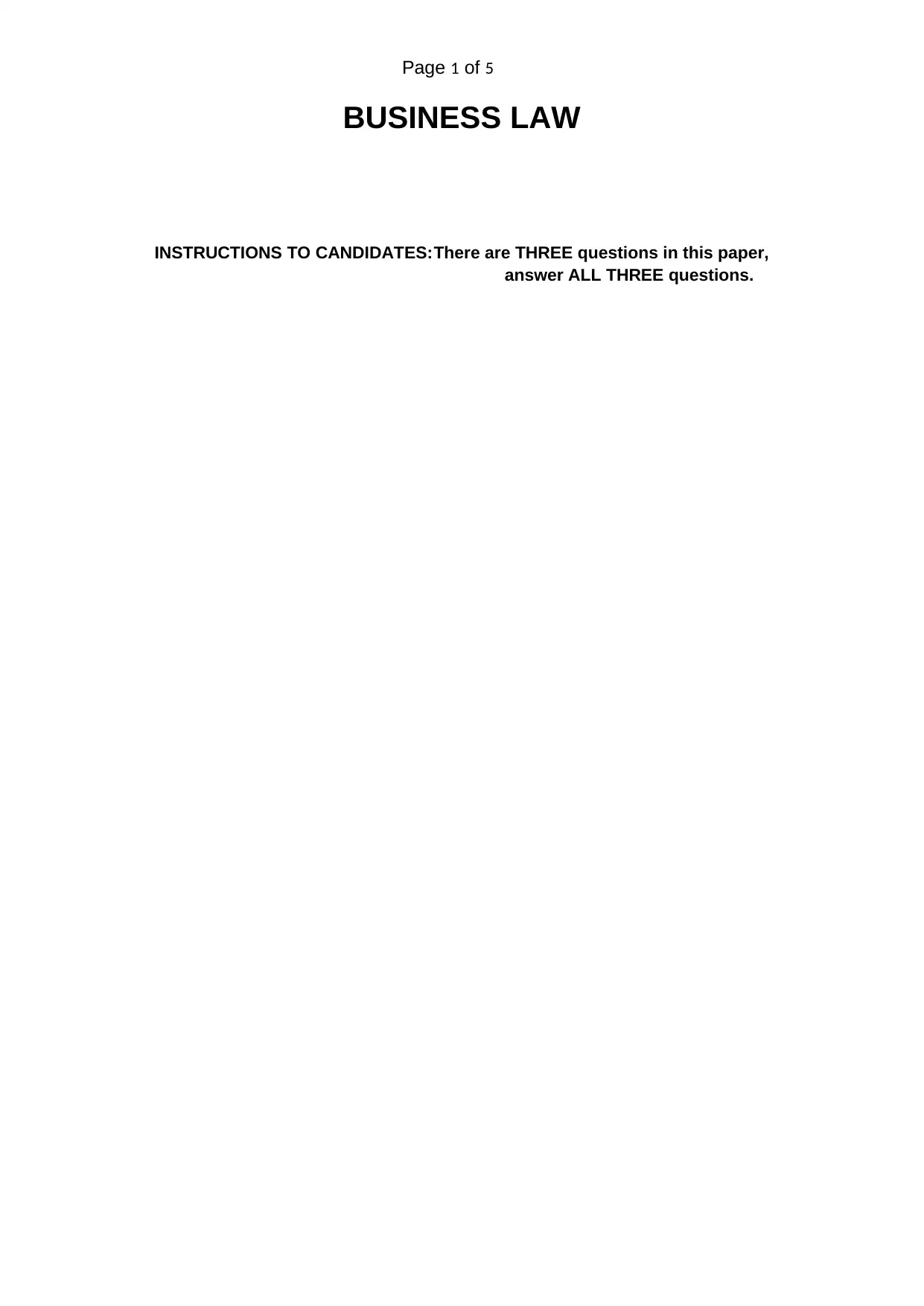
Page 1 of 5
BUSINESS LAW
INSTRUCTIONS TO CANDIDATES:There are THREE questions in this paper,
answer ALL THREE questions.
BUSINESS LAW
INSTRUCTIONS TO CANDIDATES:There are THREE questions in this paper,
answer ALL THREE questions.
Secure Best Marks with AI Grader
Need help grading? Try our AI Grader for instant feedback on your assignments.
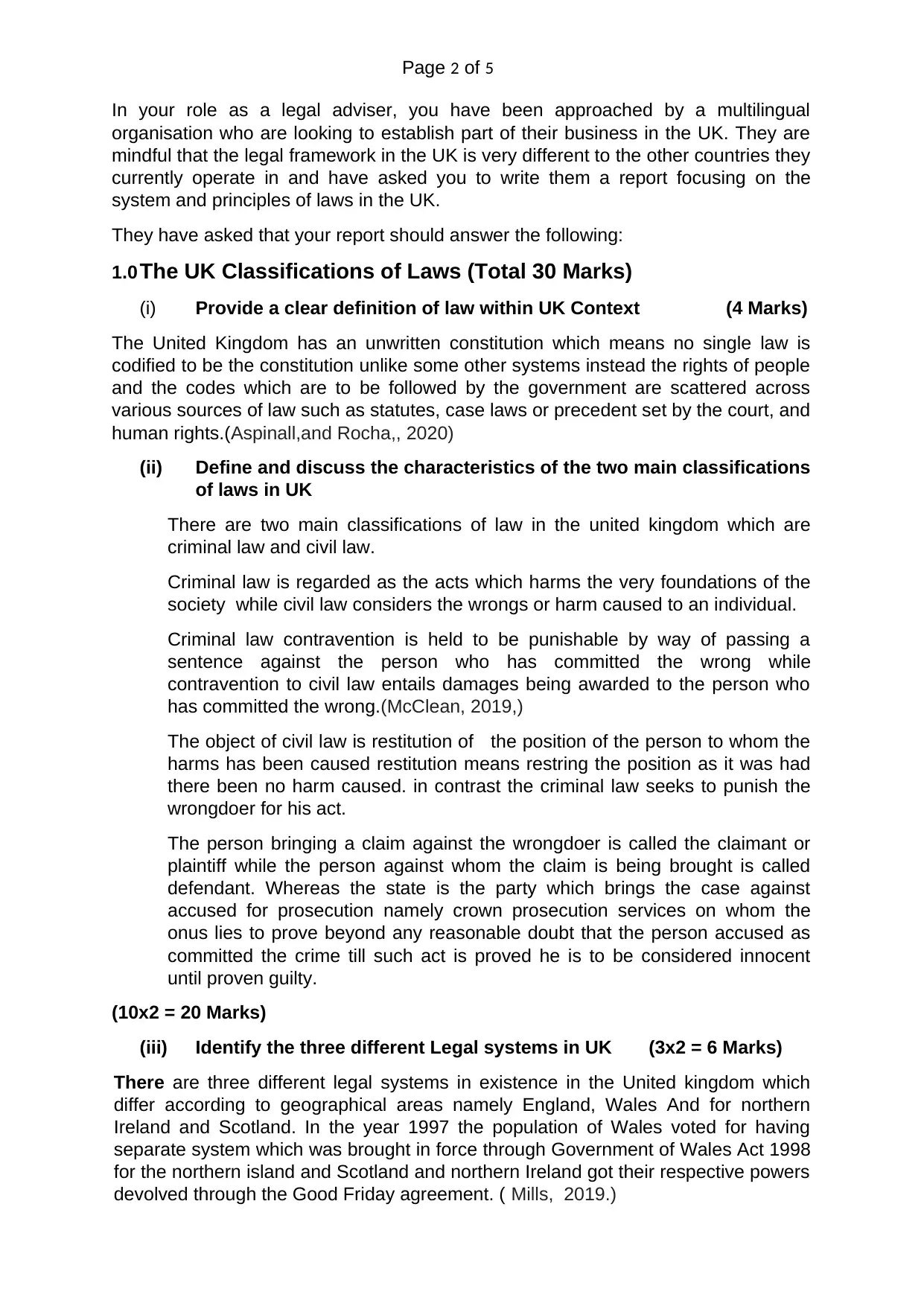
Page 2 of 5
In your role as a legal adviser, you have been approached by a multilingual
organisation who are looking to establish part of their business in the UK. They are
mindful that the legal framework in the UK is very different to the other countries they
currently operate in and have asked you to write them a report focusing on the
system and principles of laws in the UK.
They have asked that your report should answer the following:
1.0 The UK Classifications of Laws (Total 30 Marks)
(i) Provide a clear definition of law within UK Context (4 Marks)
The United Kingdom has an unwritten constitution which means no single law is
codified to be the constitution unlike some other systems instead the rights of people
and the codes which are to be followed by the government are scattered across
various sources of law such as statutes, case laws or precedent set by the court, and
human rights.(Aspinall,and Rocha,, 2020)
(ii) Define and discuss the characteristics of the two main classifications
of laws in UK
There are two main classifications of law in the united kingdom which are
criminal law and civil law.
Criminal law is regarded as the acts which harms the very foundations of the
society while civil law considers the wrongs or harm caused to an individual.
Criminal law contravention is held to be punishable by way of passing a
sentence against the person who has committed the wrong while
contravention to civil law entails damages being awarded to the person who
has committed the wrong.(McClean, 2019,)
The object of civil law is restitution of the position of the person to whom the
harms has been caused restitution means restring the position as it was had
there been no harm caused. in contrast the criminal law seeks to punish the
wrongdoer for his act.
The person bringing a claim against the wrongdoer is called the claimant or
plaintiff while the person against whom the claim is being brought is called
defendant. Whereas the state is the party which brings the case against
accused for prosecution namely crown prosecution services on whom the
onus lies to prove beyond any reasonable doubt that the person accused as
committed the crime till such act is proved he is to be considered innocent
until proven guilty.
(10x2 = 20 Marks)
(iii) Identify the three different Legal systems in UK (3x2 = 6 Marks)
There are three different legal systems in existence in the United kingdom which
differ according to geographical areas namely England, Wales And for northern
Ireland and Scotland. In the year 1997 the population of Wales voted for having
separate system which was brought in force through Government of Wales Act 1998
for the northern island and Scotland and northern Ireland got their respective powers
devolved through the Good Friday agreement. ( Mills, 2019.)
In your role as a legal adviser, you have been approached by a multilingual
organisation who are looking to establish part of their business in the UK. They are
mindful that the legal framework in the UK is very different to the other countries they
currently operate in and have asked you to write them a report focusing on the
system and principles of laws in the UK.
They have asked that your report should answer the following:
1.0 The UK Classifications of Laws (Total 30 Marks)
(i) Provide a clear definition of law within UK Context (4 Marks)
The United Kingdom has an unwritten constitution which means no single law is
codified to be the constitution unlike some other systems instead the rights of people
and the codes which are to be followed by the government are scattered across
various sources of law such as statutes, case laws or precedent set by the court, and
human rights.(Aspinall,and Rocha,, 2020)
(ii) Define and discuss the characteristics of the two main classifications
of laws in UK
There are two main classifications of law in the united kingdom which are
criminal law and civil law.
Criminal law is regarded as the acts which harms the very foundations of the
society while civil law considers the wrongs or harm caused to an individual.
Criminal law contravention is held to be punishable by way of passing a
sentence against the person who has committed the wrong while
contravention to civil law entails damages being awarded to the person who
has committed the wrong.(McClean, 2019,)
The object of civil law is restitution of the position of the person to whom the
harms has been caused restitution means restring the position as it was had
there been no harm caused. in contrast the criminal law seeks to punish the
wrongdoer for his act.
The person bringing a claim against the wrongdoer is called the claimant or
plaintiff while the person against whom the claim is being brought is called
defendant. Whereas the state is the party which brings the case against
accused for prosecution namely crown prosecution services on whom the
onus lies to prove beyond any reasonable doubt that the person accused as
committed the crime till such act is proved he is to be considered innocent
until proven guilty.
(10x2 = 20 Marks)
(iii) Identify the three different Legal systems in UK (3x2 = 6 Marks)
There are three different legal systems in existence in the United kingdom which
differ according to geographical areas namely England, Wales And for northern
Ireland and Scotland. In the year 1997 the population of Wales voted for having
separate system which was brought in force through Government of Wales Act 1998
for the northern island and Scotland and northern Ireland got their respective powers
devolved through the Good Friday agreement. ( Mills, 2019.)
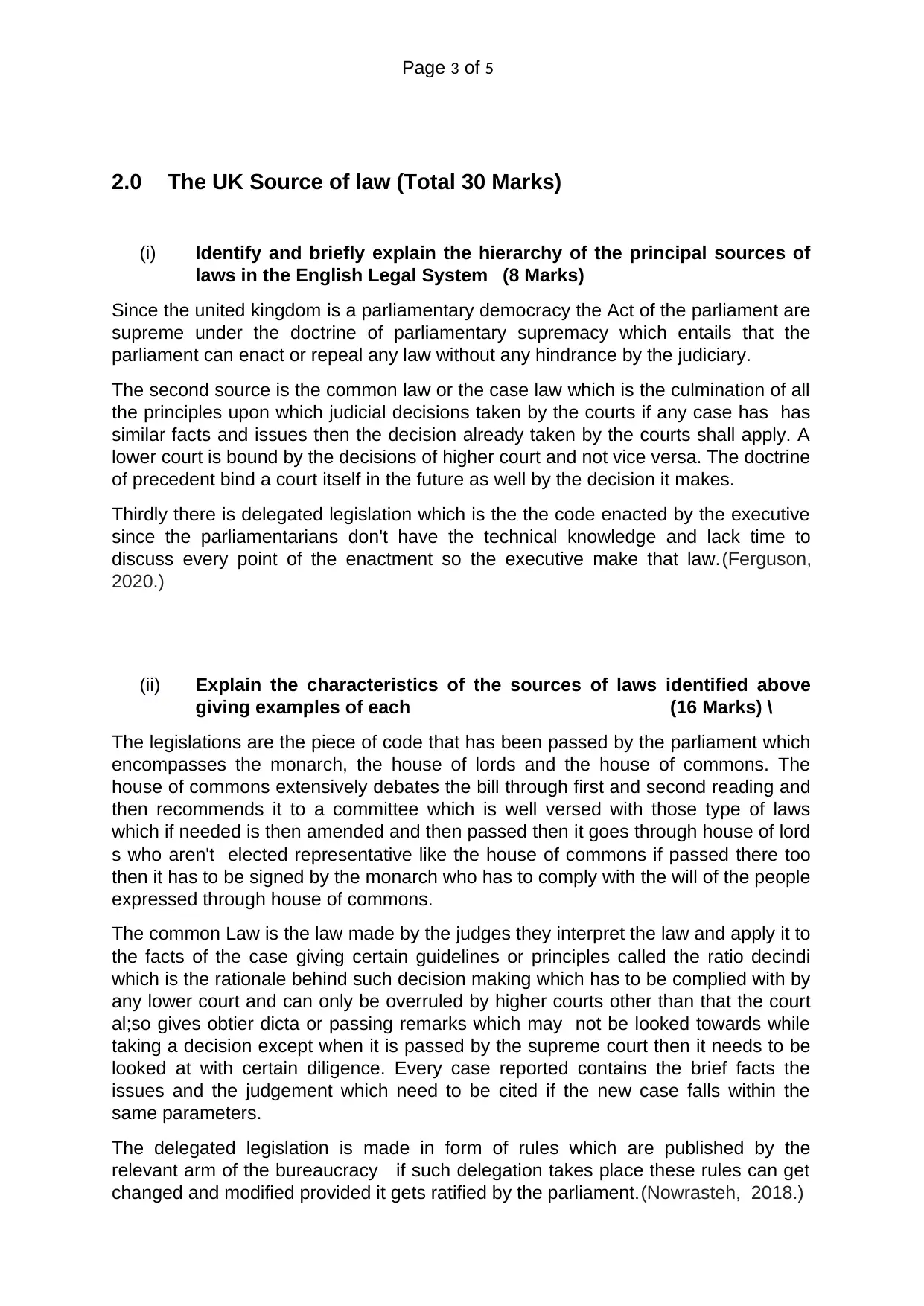
Page 3 of 5
2.0 The UK Source of law (Total 30 Marks)
(i) Identify and briefly explain the hierarchy of the principal sources of
laws in the English Legal System (8 Marks)
Since the united kingdom is a parliamentary democracy the Act of the parliament are
supreme under the doctrine of parliamentary supremacy which entails that the
parliament can enact or repeal any law without any hindrance by the judiciary.
The second source is the common law or the case law which is the culmination of all
the principles upon which judicial decisions taken by the courts if any case has has
similar facts and issues then the decision already taken by the courts shall apply. A
lower court is bound by the decisions of higher court and not vice versa. The doctrine
of precedent bind a court itself in the future as well by the decision it makes.
Thirdly there is delegated legislation which is the the code enacted by the executive
since the parliamentarians don't have the technical knowledge and lack time to
discuss every point of the enactment so the executive make that law.(Ferguson,
2020.)
(ii) Explain the characteristics of the sources of laws identified above
giving examples of each (16 Marks) \
The legislations are the piece of code that has been passed by the parliament which
encompasses the monarch, the house of lords and the house of commons. The
house of commons extensively debates the bill through first and second reading and
then recommends it to a committee which is well versed with those type of laws
which if needed is then amended and then passed then it goes through house of lord
s who aren't elected representative like the house of commons if passed there too
then it has to be signed by the monarch who has to comply with the will of the people
expressed through house of commons.
The common Law is the law made by the judges they interpret the law and apply it to
the facts of the case giving certain guidelines or principles called the ratio decindi
which is the rationale behind such decision making which has to be complied with by
any lower court and can only be overruled by higher courts other than that the court
al;so gives obtier dicta or passing remarks which may not be looked towards while
taking a decision except when it is passed by the supreme court then it needs to be
looked at with certain diligence. Every case reported contains the brief facts the
issues and the judgement which need to be cited if the new case falls within the
same parameters.
The delegated legislation is made in form of rules which are published by the
relevant arm of the bureaucracy if such delegation takes place these rules can get
changed and modified provided it gets ratified by the parliament.(Nowrasteh, 2018.)
2.0 The UK Source of law (Total 30 Marks)
(i) Identify and briefly explain the hierarchy of the principal sources of
laws in the English Legal System (8 Marks)
Since the united kingdom is a parliamentary democracy the Act of the parliament are
supreme under the doctrine of parliamentary supremacy which entails that the
parliament can enact or repeal any law without any hindrance by the judiciary.
The second source is the common law or the case law which is the culmination of all
the principles upon which judicial decisions taken by the courts if any case has has
similar facts and issues then the decision already taken by the courts shall apply. A
lower court is bound by the decisions of higher court and not vice versa. The doctrine
of precedent bind a court itself in the future as well by the decision it makes.
Thirdly there is delegated legislation which is the the code enacted by the executive
since the parliamentarians don't have the technical knowledge and lack time to
discuss every point of the enactment so the executive make that law.(Ferguson,
2020.)
(ii) Explain the characteristics of the sources of laws identified above
giving examples of each (16 Marks) \
The legislations are the piece of code that has been passed by the parliament which
encompasses the monarch, the house of lords and the house of commons. The
house of commons extensively debates the bill through first and second reading and
then recommends it to a committee which is well versed with those type of laws
which if needed is then amended and then passed then it goes through house of lord
s who aren't elected representative like the house of commons if passed there too
then it has to be signed by the monarch who has to comply with the will of the people
expressed through house of commons.
The common Law is the law made by the judges they interpret the law and apply it to
the facts of the case giving certain guidelines or principles called the ratio decindi
which is the rationale behind such decision making which has to be complied with by
any lower court and can only be overruled by higher courts other than that the court
al;so gives obtier dicta or passing remarks which may not be looked towards while
taking a decision except when it is passed by the supreme court then it needs to be
looked at with certain diligence. Every case reported contains the brief facts the
issues and the judgement which need to be cited if the new case falls within the
same parameters.
The delegated legislation is made in form of rules which are published by the
relevant arm of the bureaucracy if such delegation takes place these rules can get
changed and modified provided it gets ratified by the parliament.(Nowrasteh, 2018.)
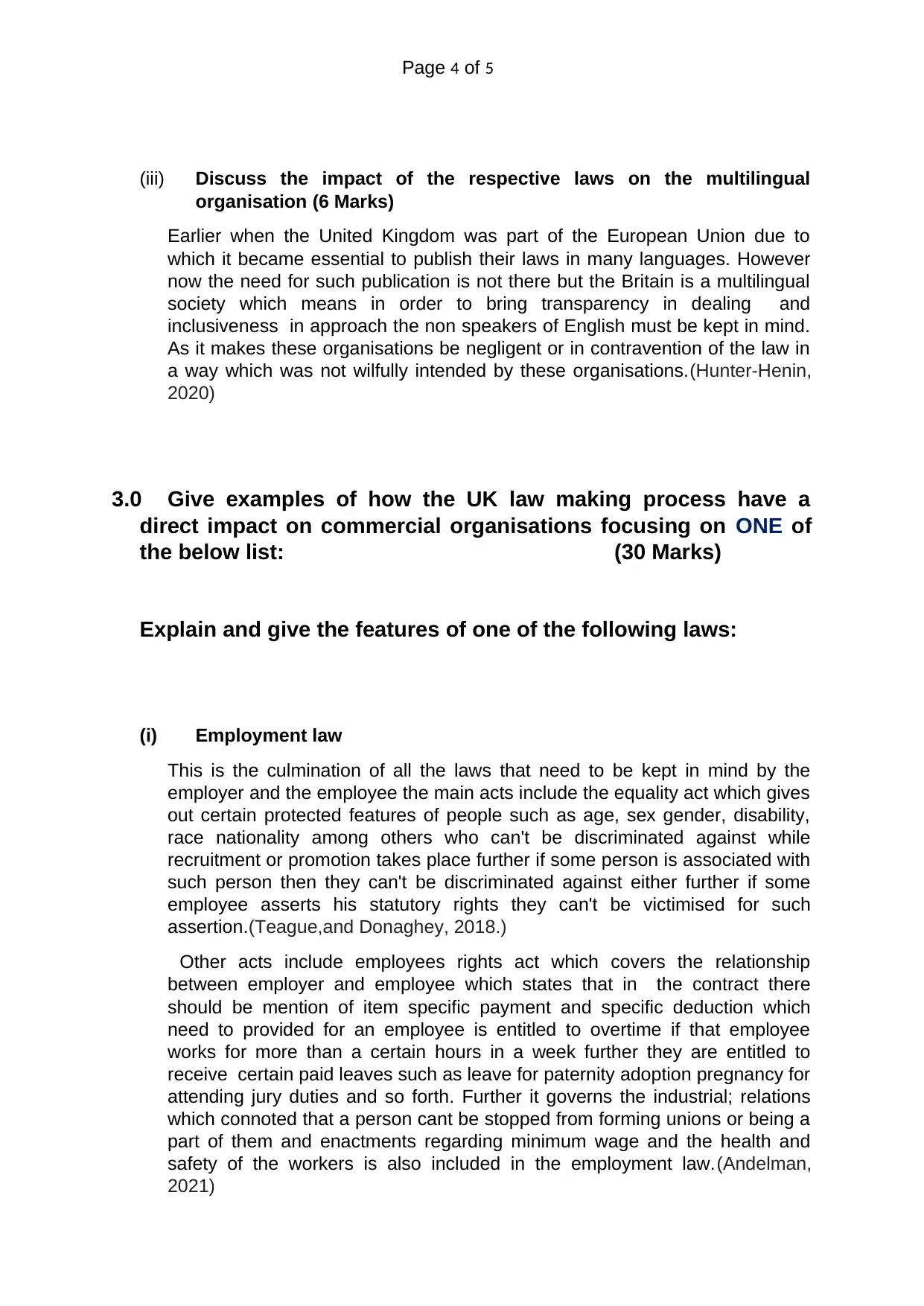
Page 4 of 5
(iii) Discuss the impact of the respective laws on the multilingual
organisation (6 Marks)
Earlier when the United Kingdom was part of the European Union due to
which it became essential to publish their laws in many languages. However
now the need for such publication is not there but the Britain is a multilingual
society which means in order to bring transparency in dealing and
inclusiveness in approach the non speakers of English must be kept in mind.
As it makes these organisations be negligent or in contravention of the law in
a way which was not wilfully intended by these organisations.(Hunter-Henin,
2020)
3.0 Give examples of how the UK law making process have a
direct impact on commercial organisations focusing on ONE of
the below list: (30 Marks)
Explain and give the features of one of the following laws:
(i) Employment law
This is the culmination of all the laws that need to be kept in mind by the
employer and the employee the main acts include the equality act which gives
out certain protected features of people such as age, sex gender, disability,
race nationality among others who can't be discriminated against while
recruitment or promotion takes place further if some person is associated with
such person then they can't be discriminated against either further if some
employee asserts his statutory rights they can't be victimised for such
assertion.(Teague,and Donaghey, 2018.)
Other acts include employees rights act which covers the relationship
between employer and employee which states that in the contract there
should be mention of item specific payment and specific deduction which
need to provided for an employee is entitled to overtime if that employee
works for more than a certain hours in a week further they are entitled to
receive certain paid leaves such as leave for paternity adoption pregnancy for
attending jury duties and so forth. Further it governs the industrial; relations
which connoted that a person cant be stopped from forming unions or being a
part of them and enactments regarding minimum wage and the health and
safety of the workers is also included in the employment law.(Andelman,
2021)
(iii) Discuss the impact of the respective laws on the multilingual
organisation (6 Marks)
Earlier when the United Kingdom was part of the European Union due to
which it became essential to publish their laws in many languages. However
now the need for such publication is not there but the Britain is a multilingual
society which means in order to bring transparency in dealing and
inclusiveness in approach the non speakers of English must be kept in mind.
As it makes these organisations be negligent or in contravention of the law in
a way which was not wilfully intended by these organisations.(Hunter-Henin,
2020)
3.0 Give examples of how the UK law making process have a
direct impact on commercial organisations focusing on ONE of
the below list: (30 Marks)
Explain and give the features of one of the following laws:
(i) Employment law
This is the culmination of all the laws that need to be kept in mind by the
employer and the employee the main acts include the equality act which gives
out certain protected features of people such as age, sex gender, disability,
race nationality among others who can't be discriminated against while
recruitment or promotion takes place further if some person is associated with
such person then they can't be discriminated against either further if some
employee asserts his statutory rights they can't be victimised for such
assertion.(Teague,and Donaghey, 2018.)
Other acts include employees rights act which covers the relationship
between employer and employee which states that in the contract there
should be mention of item specific payment and specific deduction which
need to provided for an employee is entitled to overtime if that employee
works for more than a certain hours in a week further they are entitled to
receive certain paid leaves such as leave for paternity adoption pregnancy for
attending jury duties and so forth. Further it governs the industrial; relations
which connoted that a person cant be stopped from forming unions or being a
part of them and enactments regarding minimum wage and the health and
safety of the workers is also included in the employment law.(Andelman,
2021)
Secure Best Marks with AI Grader
Need help grading? Try our AI Grader for instant feedback on your assignments.
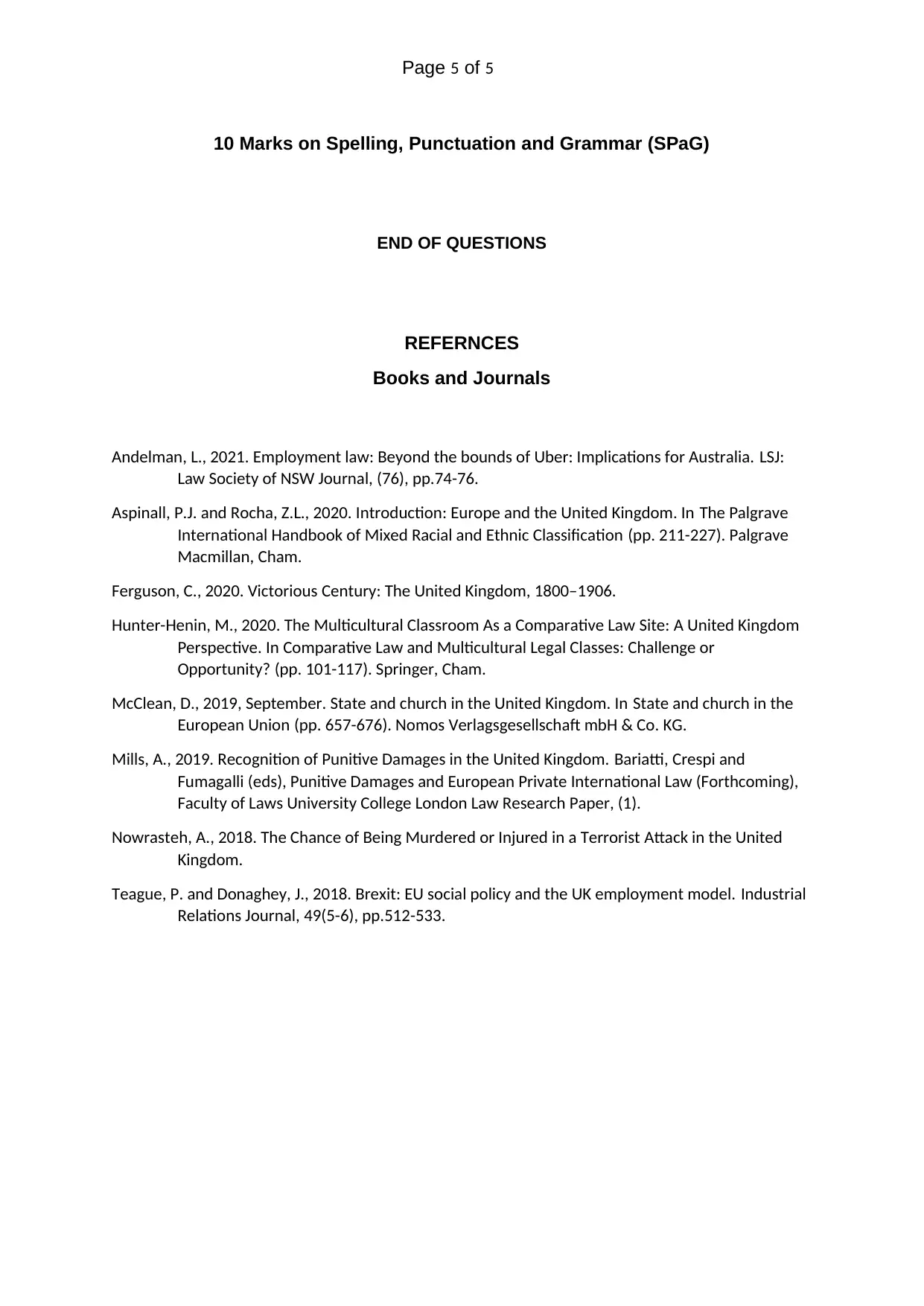
Page 5 of 5
10 Marks on Spelling, Punctuation and Grammar (SPaG)
END OF QUESTIONS
REFERNCES
Books and Journals
Andelman, L., 2021. Employment law: Beyond the bounds of Uber: Implications for Australia. LSJ:
Law Society of NSW Journal, (76), pp.74-76.
Aspinall, P.J. and Rocha, Z.L., 2020. Introduction: Europe and the United Kingdom. In The Palgrave
International Handbook of Mixed Racial and Ethnic Classification (pp. 211-227). Palgrave
Macmillan, Cham.
Ferguson, C., 2020. Victorious Century: The United Kingdom, 1800–1906.
Hunter-Henin, M., 2020. The Multicultural Classroom As a Comparative Law Site: A United Kingdom
Perspective. In Comparative Law and Multicultural Legal Classes: Challenge or
Opportunity? (pp. 101-117). Springer, Cham.
McClean, D., 2019, September. State and church in the United Kingdom. In State and church in the
European Union (pp. 657-676). Nomos Verlagsgesellschaft mbH & Co. KG.
Mills, A., 2019. Recognition of Punitive Damages in the United Kingdom. Bariatti, Crespi and
Fumagalli (eds), Punitive Damages and European Private International Law (Forthcoming),
Faculty of Laws University College London Law Research Paper, (1).
Nowrasteh, A., 2018. The Chance of Being Murdered or Injured in a Terrorist Attack in the United
Kingdom.
Teague, P. and Donaghey, J., 2018. Brexit: EU social policy and the UK employment model. Industrial
Relations Journal, 49(5-6), pp.512-533.
10 Marks on Spelling, Punctuation and Grammar (SPaG)
END OF QUESTIONS
REFERNCES
Books and Journals
Andelman, L., 2021. Employment law: Beyond the bounds of Uber: Implications for Australia. LSJ:
Law Society of NSW Journal, (76), pp.74-76.
Aspinall, P.J. and Rocha, Z.L., 2020. Introduction: Europe and the United Kingdom. In The Palgrave
International Handbook of Mixed Racial and Ethnic Classification (pp. 211-227). Palgrave
Macmillan, Cham.
Ferguson, C., 2020. Victorious Century: The United Kingdom, 1800–1906.
Hunter-Henin, M., 2020. The Multicultural Classroom As a Comparative Law Site: A United Kingdom
Perspective. In Comparative Law and Multicultural Legal Classes: Challenge or
Opportunity? (pp. 101-117). Springer, Cham.
McClean, D., 2019, September. State and church in the United Kingdom. In State and church in the
European Union (pp. 657-676). Nomos Verlagsgesellschaft mbH & Co. KG.
Mills, A., 2019. Recognition of Punitive Damages in the United Kingdom. Bariatti, Crespi and
Fumagalli (eds), Punitive Damages and European Private International Law (Forthcoming),
Faculty of Laws University College London Law Research Paper, (1).
Nowrasteh, A., 2018. The Chance of Being Murdered or Injured in a Terrorist Attack in the United
Kingdom.
Teague, P. and Donaghey, J., 2018. Brexit: EU social policy and the UK employment model. Industrial
Relations Journal, 49(5-6), pp.512-533.
1 out of 5
Related Documents
Your All-in-One AI-Powered Toolkit for Academic Success.
+13062052269
info@desklib.com
Available 24*7 on WhatsApp / Email
![[object Object]](/_next/static/media/star-bottom.7253800d.svg)
Unlock your academic potential
© 2024 | Zucol Services PVT LTD | All rights reserved.





